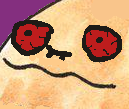I’ve seen this meme a couple times in my life, and never understood what “non-orientable” means. The word seems to imply the shape can’t be oriented, i.e. rotated in space, which a klein bottle certainly could be right?
Can somebody explain?
“Non-orientable surface” is the thing. The surface of that thing is not orientable. That means you can’t draw some normal vector to define the surface. When you traverse through the surface with a normal vector you can end up in the same point with that vector pointing the opposite direction in such a surface. That gives two directions for the same point or in other words you can’t define the surface like that with a normal vector. Its the surface and not the shape itself that is non-orientable
thanks this is the only answer I understoo!
Thanks to everybody else tho appreciate it
If you follow the surface with your finger, starting from the outside, you can end up on the inside, without traversing the surface. There is only one surface, no concept of outside or inside, contrary to a good old cube for instance.
Similar to a Moebius strip but with a higher dimension. A MS is easier to understand since you can easily make one to try to run your finger on the surface and end up anywhere.
firstly understand the context which is smooth manifolds, for simplicity imagine a 2d manifold embedded in 3d space - so a sheet of rubber that can pass through itself but can’t kink or do any funny business, just like in that sphere inversion video.
the definition of a manifold is basically that it can be built out of patches (sheets of rubber in our analogy), for instance to make a sphere, we need two sheets of rubber (ignore the actual logistics of the deformation required).
Now say that our sheets of rubber come with a textured and a smooth side, there are two ways to attach the sheets of rubber to make a sphere, one of which produces a sphere which is entirely smooth on the outside. This is what we mean by orientable, we can build it out of patches with a consistent “outside”.
Consider the counterexample of a mobius strip, which we construct from a single strip of rubber by attaching one end to the other “backwards” (rough-smooth). Since we have defined it this way, it cannot be orientable. The klein bottle is another example, but somewhat cooler than the mobius strip since its a surface without edges.
There are many other definitions of orientable depending on the context, since manifolds are a lot more general than I have shown you here.
I don’t know what orientable manifolds have to do with being responsible.
Het!
You eat this mandelbrot set right now mister or theres no desert for you!
But infinite recursion hurts my tummy
But I’m allergic to almonds and gluten intolerant!
I drink my whiskey straight from the Klein bottle.
Fair point, you can’t take a stance that’s too one-sided
obligatory mention of cliff stoll and his website.
Also obligatory link to the Numberphile video about Cliff’s Klein bottles and his crawl-space robot warehouse. https://www.youtube.com/watch?v=-k3mVnRlQLU
Also obligatory link to his really fascinating and engaging book about being one of the first people to catch a hacker: https://en.wikipedia.org/wiki/The_Cuckoo's_Egg_(book)
Wasn’t there a paper finding there are four possible klein flask orientations or something?
Yeah but it was written on a Möbius strip and we’re still not sure where the beginning and where the end was.
ETA: the paper https://people.eecs.berkeley.edu/~sequin/PAPERS/2013_JMA_Klein-bottles.pdf
No Klein bottle? Not even a small one?
Marc Blucas?
Removed by mod





